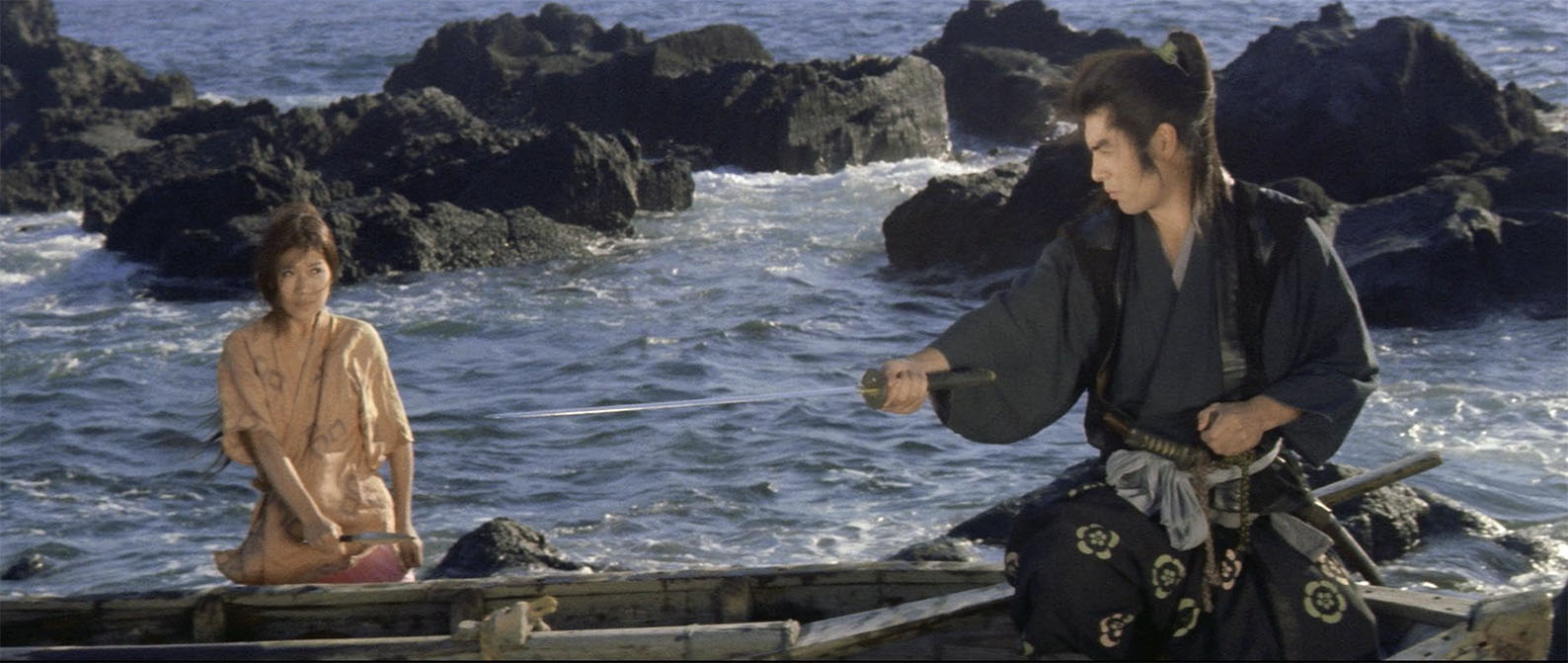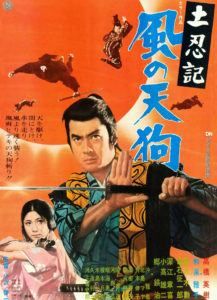Director: Keiichi Ozawa
Cast: Hideki Takahashi, Masako Izumi, Isao Natsuyagi, Seiichiro Kameishi, Shoki Fukae, Yûji Odaka, Eiji Go, Masaya Oka, Utako Shibusawa, Maya Kitajima
Running Time: 83 min.
By Will McGuire
Haunted Samurai is the perfect companion to a Lone Wolf and Cub movie marathon. This 1970 saga of evil Yagyu ninjas and noble samurai straining between the rigors of their code and the needs of their conscience feels like it takes place around the corner from the 1972 chambara classic Sword of Vengeance. That shouldn’t come as too much of a surprise given that both films are derived from the work of legendary manga creator Goseki Kojima, and both bear his striking ability to dramatize the ruthless amorality of the historical samurai against raw human problems– the heart in conflict with itself.
What I found fascinating upon watching the Diabolik Blu-ray release of the film for the first time was how the central conceit of the film both echoed, and was diametrically opposed to that of its more famous Baby Cart brothers: Rokuheita Kusanagi (Hideki Takahashi) is an enforcer for the brutal Yagyu clan charged with killing deserters, and leaving their bones to be picked apart by the crows as a warning. When his most recent execution results in the suicide of his own sister, he decides to allow his next target, a family man whose son runs into the middle of the duel, to live.
You can see where this is going: the Yagyu killer who was charged with eliminating deserters, has effectively deserted his own post and the clan, which is so ruthless they deny deserters a burial as a warning, now must make an example out of the man they trained to make examples out of people. It has the same ironic twist as Itto Ogami going from the Shogun’s executioner to a disgraced ronin who refuses to take his own life after being dishonored but from the opposite moral direction. Ogami would have continued beheading anyone he was ordered to until the Yagyu framed him. Kusanagi, on the other hand, has awakened from his moral decay. Takahashi’s performance almost recalls a Western hero who has hung up his six shooters, or Bruce Lee in the first act of The Big Boss who has forsworn fighting on an oath to his mother.
Kusanagi is primarily pursued by Kyonosuke (Isao Natsuyagi) who I really like as both a character and a performance. Kyonosuke is a servant of the Yagyu clan, but he is more concerned with the excellence of Kusanagi’s technique and his capacity to test his own limits against him rather than getting the job done by any means necessary. These two characters are technically ninjas, but for all intents and purposes, they act as Samurai and more specifically: duellists. Their final showdown is set against the backdrop of a total solar eclipse as if the heavens themselves recognize the enormity of the skill on display and take away everyone else’s ability to witness it. This began as a clan struggle but by the film’s end, it is entirely personal and also ironically, almost without malice.
The film is advertised on the Blu-ray as “the bloodiest ninja film of the time” and while it predates the Lone Wolf and Cub films that really upped the blood for chambara it doesn’t feel significantly more violent than the contemporary Zatoichi pictures. If you’re considering this film because you’re looking for gonzo shlock you’re not going to get what you want here outside of the scene where Kusanagi takes on a whole cadre of topless female warriors. This feels much more classical and, as mentioned above, the arc of the story lends the picture an almost cowboy feel. This could have been turned into a Western by Hollywood with very, very few changes.
There’s an irony there: we might expect a Diabolik release to be a real blood-and-guts affair but what we get here is a film that could easily fit into Arrow or even Eureka’s library of recent Asian releases. It is not a great film, it has a few editing issues, but it is only one notch below – and it represents an easy recommendation.
Will McGuire’s Rating: 8/10




